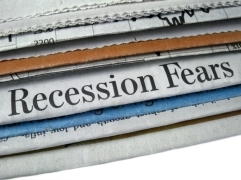
The advent of a recession doesn’t necessarily mean falling share prices. The market is always looking forward and anticipating what comes next. No-one is pencilling a big rebound in the UK economy this year, or next for that matter, but the low levels of growth expected are not exactly new conditions for British businesses, and are reflected in low valuations. It’s also important to recognise that many of the companies in the UK stock market derive lots of revenues from overseas, and so aren’t solely reliant on the UK economy.
We aren’t alone in feeling the chill of an economic slowdown. In 2024, the IMF expects the UK economy to grow by 0.6%, just behind Italy’s expected growth rate of 0.7% but ahead of Germany’s 0.5%. Politicians will no doubt get the blame for the weak UK economy, and when both major parties are making economic promises to deliver outcomes over which they can exert little control, that is entirely legitimate. But the reality is that today’s economic slump is a result of the energy price shock following Russia’s invasion of Ukraine, and the rise in interest rates necessary to tame the subsequent inflationary pressures.
Time should be a healer as economies gradually adjust to the new reality, and monetary conditions start to loosen again. In the meantime though, there are concrete steps investors can take to mitigate risks and maximise returns in the face of recessionary conditions.
1. Spread those eggs
Having a balanced and diversified portfolio is always important but takes on even greater significance when times are tough. Economic hardship puts pressure on businesses all across the market spectrum and you never know precisely where the cracks are going to appear, so you shouldn’t have too much in any one stock, fund, industry or region.
You should also keep your portfolio manageable in terms of the number of funds and stocks you hold, so you can give each one the appropriate attention. Otherwise you won’t have time to fully digest news like profit warnings or assess manager performance.
2. Be vigilant but not a vigilante
You should regularly review your portfolio, but don’t let this lead to over-trading. When markets are volatile and losses are mounting, you might be drawn into doing something just to try and exert some sort of control. It’s incredibly tempting to dispense with investments that have fallen in value. But you should resist that temptation and only make changes based on reasoned considerations rather than on a gut reaction. By constantly tinkering you’re likely to end up making mistakes, and racking up trading costs too.
3. Boost returns by saving tax
The UK tax burden is on course to hit its highest level since the end of the Second World War, in large part a result of frozen allowances, with capital gains and dividend allowances being cut too. When growth is thin on the ground, you should also ensure that you bank the easy wins. That means making sure your portfolio is invested as tax efficiently as possible using SIPPs and ISAs, and ensuring that you’re keeping charges under wraps too. The annual benefits that are yielded by these simple steps might seem small, but they will compound your returns year in year out, and lead to a bigger nest egg when you come to draw on it.
4. Don’t ignore dividends
Investors should also pay due attention to dividends. When growth is thin on the ground, dividends can keep your investment scoreboard ticking over. Poor economic conditions aren’t great for profits and hence dividends, but many UK companies have international income streams and are still making profits from UK operations despite weak economic growth.
The FTSE 100 is forecast to yield 4.2% this year according to the latest AJ Bell Dividend Dashboard, and dividend cover sits at over two times earnings. That means company profits are more than double the amount of dividends being distributed, giving companies a large buffer before they need to start thinking about cutting back again. Investors can also find some solace in investment trusts, which can hold back dividends in good years to pay out in tougher times, with some having paid a rising income to shareholders for decades.
5. Drip feed your money into the market
It’s extremely important to recognise that an expectation of future economic conditions is already baked into share prices to some degree. The market is always looking ahead and though it might sound jarring, now is probably a good time for investors to be considering when there might be some improvement in economic climes, rather than fretting about the current malaise. That doesn’t mean betting the whole farm on a swashbuckling recovery, but it might be a good time to start thinking about drip feeding money into the market.
A regular investment plan can smooth the ups and downs of the stock market, because if share prices fall, you buy in at a lower level. Recessions are part and parcel of the normal economic cycle and if you’re investing for the long term, you have to expect to encounter them. While this can be painful for your portfolio, the upswing in share prices when recovery comes knocking can be swift and powerful, and if you’re not invested when this happens you could be taking the rough without the smooth.
Disclaimer: These articles are for information purposes only and are not a personal recommendation or advice. Remember that the value of investments can change, and you could lose money as well as make it. How you're taxed will depend on your circumstances, and tax rules can change. ISA, pension and tax rules apply.
Related content
- Tue, 23/04/2024 - 16:41
- Wed, 17/04/2024 - 13:32
- Thu, 11/04/2024 - 15:20
- Thu, 11/04/2024 - 14:34
- Thu, 04/04/2024 - 17:13

